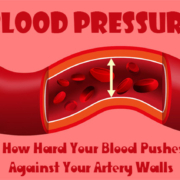Knowing Your Health Patterns
The reason it’s important to track health variables is to find any patterns in the results. Remember the study on hs-CRP and cancer? Paula immediately looked up her CRP levels and found two things. First, it had gone down consistently over several years. Second, she hadn’t had it tested every year, but she will from now on.
Remember my blood pressure? I tracked it from that point (five weeks post-surgery) through today. From 177/107, it has come down appreciably though not in a consistent way; it’s consistently around 130/80 before exercise and 110/70 after exercise. That’s two patterns.
There are some other patterns that may be more relevant. For example, perhaps you’ve had heartburn after eating. Tracking what you eat may show a pattern that the higher the fat content, the worse the heartburn seems to be; the same may be true with constipation.
In short, you may find that one thing leads to another, but only under certain conditions. It’s knowing which conditions that’s most important to finding an answer to your health issue.
Patterns for Disease States
Many conditions have patterns of events that can be predictive of disease. For example, as bone density declines, your risk of a bone fracture increases. As blood pressure goes up, so does the risk of stroke. For type 2 diabetes, as blood sugar and HbA1c rise, so does the risk of prediabetes, type 2 diabetes, and all the accompanying complications.
Those types of patterns can be predictive of disease. Or they may not. As we’ve learned in the Memos, risk factors set the odds but they’re not cause and effect. But there’s another reason.
Your Pattern
The reason tracking to establish patterns of response is important to you is that it may just be your unique pattern—because while we’re all the same in many ways, we all have our unique variations. You may not know what’s unique about you because you haven’t tested it or tracked it to find your pattern. But whether it’s your blood pressure, your blood sugar, your response to foods, or some other variable, it simply may be your individual pattern and may be indicative of nothing.
That doesn’t mean you don’t get the issue checked out by a healthcare professional, but it may mean you don’t have a disease or condition as a general response would indicate. And since you know your pattern, you can track the results of any medication or other intervention your doctor prescribes.
The Bottom Line
Tracking variables to detect patterns is useful to us all. While it won’t help everyone who tries it, the goal is to know yourself better. You won’t have to do it forever, but if you’re concerned about a specific condition, this is a way to help yourself.
And it won’t necessarily be bad news; Paula was relieved to find her hs-CRP had been going down, and you may find an encouraging pattern as well. Even if the results are not what you’d hoped, better to know than not know, right? Because now you can take action.
If you have no idea where to begin, become an Insider or Member at DrChet.com. You’ll have exclusive access to me by email or phone, and I can guide you in checking out whatever factors could be related to the health issue you’re concerned about.
What are you prepared to do today?









